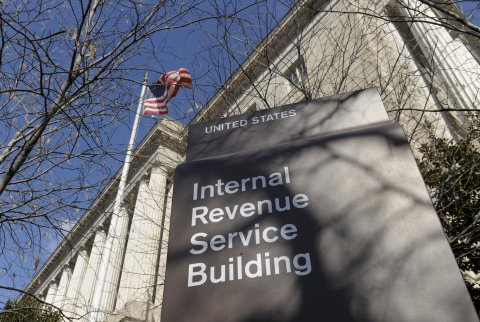Is The Recent IRS Ruling Of Bitcoin As Property A Deal Breaker?

How will the IRS ruling of Bitcoin as property rather than a currency, affect the growth, ease of use and adaptation of Bitcoin in the future?
On March 25 2014, the Internal Revenue Service (IRS) issued Notice 2014-21, stating the following:
“For federal tax purposes, virtual currency is treated as property. General tax principles applicable to property transactions apply to transactions using virtual currency. Under currently applicable law, virtual currency is not treated as currency that could generate foreign currency gain or loss for U.S. federal tax purposes.”
With the IRS weighing in on cryptocurrency and determining it to be property, there are certain important points to note. The regulation that has been called for, has been provided effectively legitimizing bitcoin, yet, to some extent, to the detriment of bitcoin as a currency.
Lets look at the bad news first
The ruling by the IRS was a blow to the adoption of bitcoin as a currency for the world. Whether legitimized or not, the effects of the ruling on bitcoin will negatively impact the ease of use and frictionless nature of bitcoin transactions greatly. In an interview with Coinsummit on the topic, Andreas Antonopoulos, Chief Security Officer at Blockchain.info, described the ruling on bitcoin as property as “an untenable burden.” He went on to elaborate that,
“It’s great for investors because it gives them clarity in capital gains, but what it means is that if I buy a cup of coffee I need to do a capital gains response for the cup of coffee, because it’s also a currency, and right now that doesn’t work in any other currency.”
Without allowing for public comment prior to the ruling announcement, an important opportunity to explain bitcoin and the ramifications of considering it as only property was missed. With regular forms of currency, you can use it for investment purposes, but at the same time spend it as money if need be. So, a US citizen may decide to invest in the British pound sterling and will pay capital gain tax on it, as an investment/property. However, if that same person decides to travel to Britain and spends that sterling or converts dollars into sterling to pay for his/her hotel or a cup of coffee, then they are not expected to pay capital gains tax on that purchase. In that case, the sterling is considered currency only.
What the IRS tax ruling means in terms of recording tax?
Basically it means all those cups of coffee you excitedly bought with bitcoin last year are going to give you a headache when it comes to doing your individual tax filing. 50 coffees = 50 capital gains tax calculations. Mined any bitcoin last year? Add the fair market value of it to your gross income. The latter isn’t actually unreasonable. Paying your taxes is not the issue, just the volume of paperwork required.
New ruling causes confusion on currency status for exchanges.
Prior to the ruling announced by the IRS, the U.S. Treasury Financial Crimes Enforcement Network or (FinCEN) had determined that bticoin is a currency, stating:
“virtual currency is a medium of exchange that operates like a currency in some environments, but does not have all the attributes of real currency. In particular, virtual currency does not have legal tender status in any jurisdiction.”
However, bitcoin exchanges and users are considered “money transmitters“, and are therefore subject to the Bank Secrecy Act. Pairing these regulations with a contradictory ruling from the IRS highlights the struggle faced by the regulators of Washington to reign in this renegade virtual currency and centralize it in some way. The problem here is that the regulatory agencies of the United States are extremely fractured, and each of these want to oversee the adoption of bitcoin in their own particular way, with little regard for the other agencies, bitcoin or the users themselves. Trying to pin down the decentralized virtual currency is the aim of the game it seems, no matter the cost to those who are using it.
The practical implications of the array of regulations now surrounding bitcoin are confusing to say the least. Bitcoin exchanges need to comply with money service regulations, despite the fact that the IRS doesn’t recognize bitcoin as money. This confusion is causing smaller exchanges to close down, it is negatively affecting the growth of bitcoin as a world currency and is destroying the opportunity we are being given to help the less fortunate succeed. It is a terrible shame to see the potential bitcoin has to raise the most disenfranchised members of society from ruin be scuppered by little more than red tape, plastered over a unique concept by those who neither need, want nor fully understand bitcoin. This is something that needs urgent attention for bitcoin to reach its potential in the future.
Let there be a silver lining, please.
The ruling by the IRS will hopefully start the conversation between experts in the bitcoin community and regulators. The ruling itself allows individuals to pay their taxes correctly, an issue that many have been looking for clarity on for some time. However, the sheer volume of paperwork that will be involved for many may put a lot of people under pressure for the April 15 2014 deadline for individual tax filings (for the fiscal year 2013). At this stage it is likely that many people will need to request an extension, in order to properly review the previous years purchases in bitcoin and ensure they are accounted for. It may be time to get a tax accountant involved. Getting penalized down the road for not paying your tax on a cup of coffee in 2013 is a painful thought.
In light of the effects, the new IRS ruling has had on bitcoin, a new petition to amend Notice 2014-2 has been submitted to the White House. The petition reasons,
“This treatment of VC is overly burdensome as it will create onerous record-keeping issues and unnecessary costs that will stifle the development and advancement of this important technology.”
This petition will hopefully help expand the discussion on bitcoin taxation with all relevant contributors further.
A resourceful community responds
In the meantime, and fortunately for the bitcoin community, a new company launched by Jake Benson, Libra, is developing a service specifically designed to deal with these bitcoin taxation issues. While the service is not yet up and running, it will hopefully help bitcoin users keep track of the capital gains on their bitcoins.
Starting with the users transaction history, which Benson says can be obtained automatically or manually, Libra will calculate the cost basis at a per-transaction level. Once completed, the service can then determine which transactions are subject to short-term or long-term capital gains. While the April 15 2014 deadline will be missed Benson explained,
“Libra for individuals will be ready in the September timeframe. That will be right in time for the extended tax deadline, so we advise everyone to file for an extension this year.”
Well, at least the answer to dealing with the mountain of paperwork the IRS ruling may create may be here soon.
Could Bitcoin really be digital gold?
Despite the arguments from the gold corner that bitcoin and gold are not comparable, the new IRS ruling may have categorized them as just that. It may just be the silver lining (or gold!) we have been hoping for. The ruling encourages bitcoin to adopt one form of monetary activity over the other, specifically as a store of value rather than a medium of exchange. In doing so, the property classification reaffirms bitcoin’s position as “digital gold“, an analog to gold. Bitcoin can be connsidered a store of value based on mathematical properties in the same way that gold is, based on chemical properties. While the classification of bitcoin as property, not currency, may have prevented any direct competition with the dollar in terms of currency transactions, it has opened the door for bitcoin to potentially exploit jurisdiction restraints as a commodity, like gold.
Like gold, which receives preferential tax treatment as a commodity, bitcoin could become a store of value, capable of backing issuance of alternative currency types or acting as a clearing house for large cross border transaction. What gives bitcoin the one-up over gold is the fact that in addition to being a potential store of value in the long term, in the short term, it still functions as currency for everyday transactions. Not only that, but bitcoin is superior for the fact that it is far more divisible than gold and costs nearly nothing to transport over long distances. The consequences of the IRS ruling may even provide bitcoin (as digital gold) with the qualities required to reach reserve currency status and make bitcoin the more suitable option for large cross border transactions.
Sum it up already!
When it comes to communications on the issue of bitcoin taxation, it may be quite easy for some to believe that the regulators imposing this untenable burden on bitcoin users did so out of ignorance. However, allowing for public comment on such matters is usually allowed, if not encouraged by those in Washington. With that in mind, speculation is rife as to whether this ruling was a badly veiled attempt to stifle bitcoin. There was always going to come a time when bitcoin could no longer be ignored by regulators. A decision would have to be made on how to regulate it. The decision made in this case may end up biting back at regulators, giving bitcoin unexpected power as a commodity. On top of that we are seeing more innovations crop up to tackle the obstacles regulators are laying in bitcoins path to success.
As much as the idea of centralizing bitcoin is discouraged, a centralized discussion on bitcoin, amongst all players involved needs to take place and those of influence within the bitcoin community need to take the lead here. The discussions need to be had to prevent further rulings, with the potential to cripple bitcoin further from being made. Without such discussions, the power of bitcoin as a currency for the world may be irreparably affected. A revision of the ruling to consider a use case based analysis may, or may not happen, but the current petition to amend Notice 2014-21 may help. This isn’t the last we’ll hear of this IRS ruling for sure.
Follow CoinReport for more bitcoin news as it unfolds.
Image via IRS









